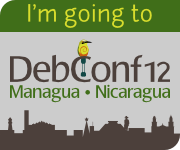

Confused yet? The popular browser extension
AdBlock for Chrome/Chromium and Safari has
launched a new crowdsourced campaign - to buy up internet advertising space inviting people to download AdBlock, so they can block ads. Additionally, if they raise enough, they'd like to get additional space for a billboard at Times Square, a full page spread in the New York Times, and even a TV slot at the Superbowl (although the target for this is $4.2M, so I'm not entirely confident they'll make it.)
However, this does raise an interesting question, which has been under debate for some time. How do you make money on the internet without adverts?
Wikipedia has a few interesting suggestions.
Firstly, affiliate programmes. These mean that any products or services that are linked or searched via the original site earn a little bit of commission for that site. Founded in the mid-90s, and most famously used by Amazon, it's a possible method for getting money. However, it should be deployed with careful thought. If a blogger or reviewer is recommending a product, is it simply because they are being paid to do so, or is it a genuine endorsement? The BBC
ban this practice, and the Society of Professional Journalists also has
strong guidelines on taking gifts. Interestingly, a few search engines now offer this to browsers for them sending their default search traffic to them.
Secondly, you could engage in (what I consider to be) the shady practice of data monetisation. People visit a website, and they leave data about their visit. By visiting here, you've told me that you're probably interested in technology issues, what country and city you're from, and where you came from. Other programmes and sites will also be able to wrap up what other sites you've visited, and can build up quite a profile of your browsing habits. Add together a rather unscrupulous vendor, and they can also know your contact details. This metadata can then be sold on.
Thirdly, you can essentially ask your readers for money. Donations, via a micropayment link (which I use) or larger donation requests. Another method is to have a membership system, where content is locked up behind a paywall. This does, however, risk making your content less valuable as people will just head elsewhere for news and opinion. To counter this, a couple of sites (
LWN,
Slashdot) simply delay the latest news for a little while. Alternatively, you can
just ask like the fantastic
C G P Grey has done. Interestingly, he also has a
great video on why advertising can be a bad thing for content creators.
Lastly, you can sell things. This could be your authorship services on another site as a guest post, writing a book, offering consultancy services, or simple merchandise.
In summary though, which is more honest? An advert may well bend your view on what sort of content is being created, but is at least a lot more open than potentially hiding real motives behind affiliate links, and a lot more open than selling data. Asking for money is fairly straightforward, though could easily backfire if it's viewed as begging. Google's advertising income totalled $43.7 billion in 2012 - so it's quite clear that advertising is big business. Websites cost money to run, can the web survive in an ad-free environment? If so, it certainly won't be the same web as we know today.
 A source close to the Debian Project has informed me that the project will break from it s long running tradition of Pixar codenames for their releases.
A source close to the Debian Project has informed me that the project will break from it s long running tradition of Pixar codenames for their releases.



 Do you remember at school, when the teachers mentioned that something would be on your "permanent record"? The big secret is that there isn't one. Apologies to all teachers, but it's not likely this blog's demographic will reach your students. However, since the advent of the internet, a permanent record does exist. Everywhere from the
Do you remember at school, when the teachers mentioned that something would be on your "permanent record"? The big secret is that there isn't one. Apologies to all teachers, but it's not likely this blog's demographic will reach your students. However, since the advent of the internet, a permanent record does exist. Everywhere from the 
 Today, OFCOM issued a
Today, OFCOM issued a 


 With all the discussion about SHA-1 weaknesses and generation of new OpenPGP
keys going on there's some concern about how the web of trust will be affected.
I'm particularly interested in the impact on Debian; while it's possible to add
new keys and keep the old ones around that hasn't worked so well for us with
the migration away from PGPv3 keys. We still have 125 v3 keys left, many of
them for users who also have a v4 key but haven't asked for the v3 key to be
removed or responded to my email prodding them about it. I don't want to repeat
that.
With all the discussion about SHA-1 weaknesses and generation of new OpenPGP
keys going on there's some concern about how the web of trust will be affected.
I'm particularly interested in the impact on Debian; while it's possible to add
new keys and keep the old ones around that hasn't worked so well for us with
the migration away from PGPv3 keys. We still have 125 v3 keys left, many of
them for users who also have a v4 key but haven't asked for the v3 key to be
removed or responded to my email prodding them about it. I don't want to repeat
that.